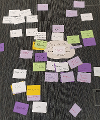Climate Jury Session Four

Preston People's Climate Jury Session 4
At the beginning of the session, the jury were asked to consider and discuss a positive change that they had experienced or were aware of, whether on a personal, local, or national level, and consider how that change had come about.
The purpose of the exercise was to highlight the different roles that individuals, groups and organisations play in driving changes that improve people's lives.
This was followed by a series of short contributions from local "change makers" who were invited from across the public, corporate, trades union and community sectors.
Each speaker described a positive change in which they were involved, or which they were continuing to deliver.
- Sarah Threlfall, the Deputy Chief Executive at Preston City Council, described her involvement in a joint initiative with other public sector partners to improve support for care leavers when she worked previously at Tameside Council.
- Bill Adams, the Regional Secretary of the TUC for Yorkshire and the Humber region, described the significant contribution made by unionised workers at a manufacturing company in Bradford to reducing production costs, and securing their continued employment, by offering their expertise to the management team.
- Annie Wynn, Chief Executive at Let's Grow Preston, described the substantial contribution of fresh produce made by allotmenteers across the city to Preston's food banks and the positive impact this is having on improving nutrition in the city.
- Kailash Parekh, from the Lancaster Action Environment and Protection (LEAP) described the work that her organisation is undertaking to promote education about climate change to young people, including those within the Hindu community.
- Davinia Jackson, from Preston Citizens, outlined the organising approach developed by Citizens UK to bring about change, including though its campaigns on the Real Living Wage, which has its roots in the Trades Union and Civil Rights movements.
- Stephen Sykes, Director of the East Lancashire Chamber of Commerce's 'Low Carbon Chamber', talked about his work advising private companies in the region on decarbonization. He observed that carbon reduction has moved from being 'niche' in the 1990s to a commitment embraced by the mainstream today.
- Chris Davis, Director of Soundskills on the Brookfield estate, described his work to promote energy efficiency to the local community, including his success in raising funding to retrofit the Soundskills community hub itself and offer new training opportunities to local people.

Following the presentations, the jury were invited to join one of the speakers to discuss in greater depth the change they had described, including the role of different groups and organisations in making change possible.
The session ended with a 'power mapping' exercise. Drawing on the insights gained in the previous discussions, and on their own understanding and experience of change, the jury identified all the people and organisations who they felt had the power to influence and address climate change in Preston. They wrote each one down on a card, and then placed them within a circle, with those placed closest to the centre representing the 'change makers' with the greatest power to address climate change in the city.
In later sessions the jury were able to draw on the outcome of this exercise to develop their recommendations in response to the question they were asked to consider throughout the jury process:
How can we in Preston work together to address the opportunities and challenges of climate change in a way that is fair to everyone?





